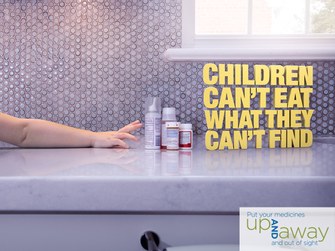Up and Away: Storing Medicines Safely
 A well-known substance often found in plain sight, on nightstands, bathroom counters, and in women’s purses, is causing parents to place frantic phone calls to poison centers around the country. The culprit: acetaminophen. Acetaminophen is an over-the-counter pain reliever and fever reducer used to treat many conditions. The most recognized brand name is Tylenol, but there are more than 600 different prescription and over-the-counter medicines that contain acetaminophen.
A well-known substance often found in plain sight, on nightstands, bathroom counters, and in women’s purses, is causing parents to place frantic phone calls to poison centers around the country. The culprit: acetaminophen. Acetaminophen is an over-the-counter pain reliever and fever reducer used to treat many conditions. The most recognized brand name is Tylenol, but there are more than 600 different prescription and over-the-counter medicines that contain acetaminophen.
With 50 million Americans using medicines that contain this ingredient each week, poison centers and emergency rooms are regularly called upon to address preventable poisonings. In fact, over 50% of calls to the Washington Poison Center are related to medicines.
Nationwide, about 60,000 young children end up in emergency departments after getting into medicines left within their reach, making medicines a leading cause of poisonings in young children. Add to this the smaller number of cases of poisoning caused by adults giving the wrong dose of medicine to a child, and it’s easy to see why it’s important for parents to understand how to safely give and store medicines.
Practice safe storage and dosing
Dr. Suzan Mazor, medical director of Toxicology at Seattle Children’s, shares the following tips for using and storing acetaminophen, other medicines and vitamins in your home and the homes where your child visits:
- Put all vitamins and medicines up and away – out of reach and out of sight of children. Do this after taking or giving each dose, even with medicines you use every day.
- If you keep medicines in your purse, make sure that your purse is stored up and away, rather than left lying where a child can get to it.
- When visitors arrive, give them a safe place to store their belongings in case they carry medicines.
- Safely get rid of expired and unneeded medicines. Find a medicine take back location or follow the instructions for last resort disposal.
- Teach your children what a medicine is. Never call medicine candy or juice.
- Tell your child to never take medicine on their own. A trusted grown-up in charge of their care should give them medicine when needed.
- When giving medicine to your child, read the label and follow the instructions every time. Give the right dose for your child’s age and weight, using the dosing device that came with the medicine.
- After use, twist medicine bottles with safety caps until they click to relock the cap. Know that safety caps are not childproof, so still store the bottles up and away, out of children’s reach and sight.
- Call your child’s doctor, pharmacist or the Poison Center with questions about medicines.
- Be prepared for poisoning emergencies by programming the national poison center help line in your phones: 1-800-222-1222.
- Call the poison center right away if you think your child might have gotten into a medicine or vitamin.
Review your storage practices today, and every day
Children are naturally curious and it only takes a moment for them to get into medicines or other poisons while a parent or caregiver isn’t looking.
"In addition to medicines, we see small children getting into recreational substances like marijuana edibles and e-cigarette liquid, both of which can be extremely dangerous when a child ingests them," said Mazor. "Please take a few minutes to ensure that medicines and recreational substances are stored up, away and out of sight of young children."
Resources
About the Author
 Heather Cooper is a community health educator in Marketing and Communications at Seattle Children’s Hospital.
Heather Cooper is a community health educator in Marketing and Communications at Seattle Children’s Hospital.
Document Actions